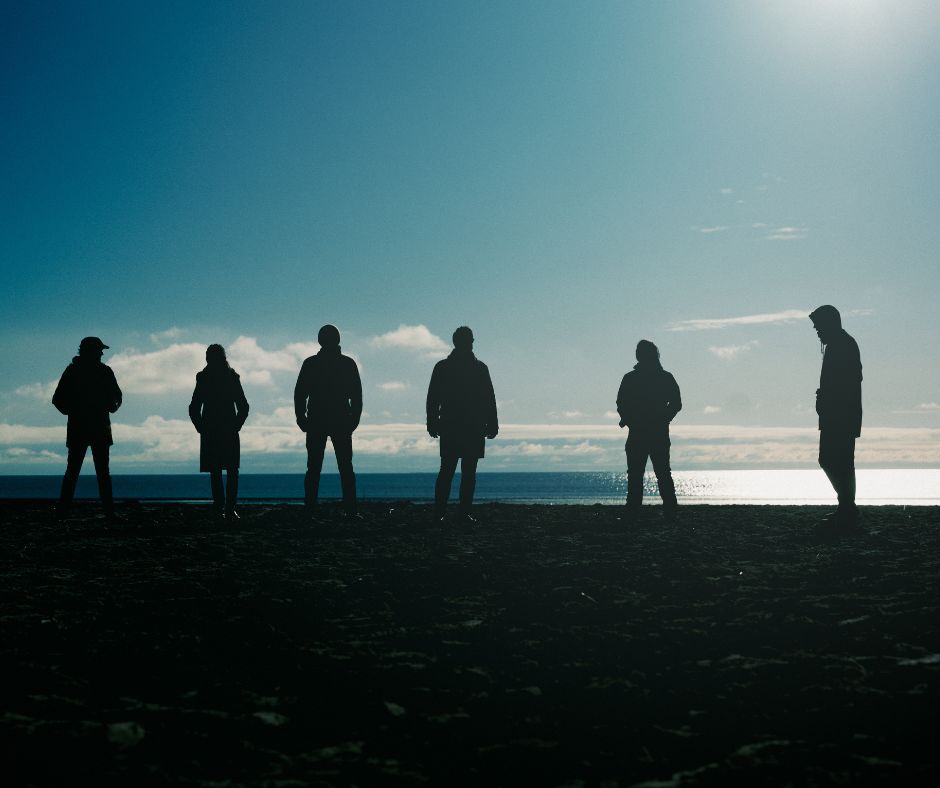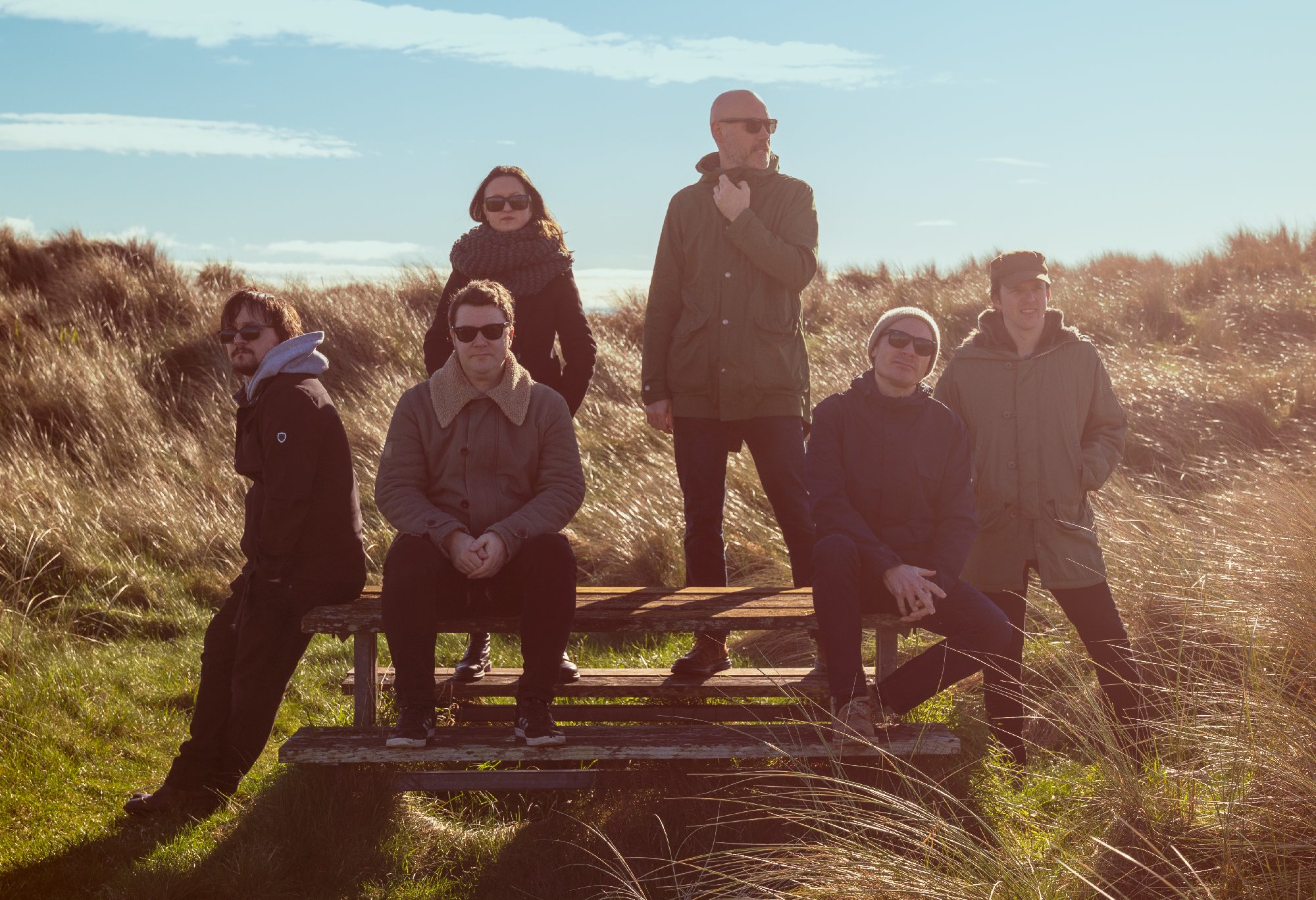The Irish self-declared post-shoegaze band Sun Mahshene began when musician Nathan Henderson started making demos in his bedroom, incorporating elements from indie rock, shoegaze, Madchester, Britpop and neo-psychedelia.
In 2018, Nathan sought to expand these demos into a project. “I guess he started in 2016 and then realised that he needed to get musicians to do what he wanted to do with it,” Robert Crosbie, who joined as a vocalist and guitarist, tells Post-Burnout.
“And he more or less just went around Dublin, poaching people from other bands. [Laughs] Actually, poaching people from their own bands. I had my own band; David [Hillard, their bassist and vocalist] did his own music; Asia [Wolf] on keyboards had her band, and then he went, ‘Oh, I’ll add a bit of you! I’ll add a bit of you!’, and he got us all in the band.
“It kind of went through various line-up changes over a period of time and we had [the] COVID [pandemic] in the middle of all that. We kind of all got together, properly, in the last couple of years, and that’s kind of the story of how that all happened, and it’s kind of funny, really, because it was like, ‘Why should I struggle with my own thing when I can just join this one?’ [Laughs]”
When we asked what it was about what Nathan was doing that initially attracted them, Robert responded with, “Well, certainly for me, I knew Nathan from a different band, and I nearly joined that one, and he originally asked me to come in and help out on some of the recording on some of the EP stuff.
“And he sent me all the tracks, and I was just struck by the melody, really, more than anything. It was kind of in this real psych, reverb-laden, heavy guitar kind of sound. It was skirting towards shoegaze, but it was more really on the psych end of things. Very heavy stuff.
“But what really jumped out to me was the melody in the songs and the lyrics. You could hear what they were saying. [Laughs] They were tunes, and really good tunes at that. So, that was the primary thing, because the problem with shoegaze sometimes is that you can have all the effects, and the sounds, and the swirly atmospherics, and all that kind of stuff, but you don’t really often get a lot of tunes that you can sing or [translate to] acoustic guitar.”

Photo courtesy of Cobra Promotions
On his reason for joining, their bassist David responded with, “It was unlike anything else that was around at the time. I’d been in bands for a while before and I’d been doing my own stuff for a couple of years, and I was looking to get back into a band.
“I grew up around the corner from Nathan, so I always knew Nathan, and when I saw that he was looking for musicians, straight away. He sent me four songs to learn; I learnt everything that they had available. I made sure. I wanted this gig. I wanted to destroy all competition to get the role with this band. [Laughs]
“I think for me, it was mainly that other bands that were around were kind of doing the same kind of post-punk thing. Everyone was doing that fast, barre chords, shouty, not a lot of melody, a lot of energy, but not a lot going on.
“I just saw that as a bit of a phase thing [that’s] going to date. In five years’ time, people will look back on the whole post-punk thing and just go, ‘They’re all a bit samey. They’re all cheap knockoffs of the previous one. Where, I think with Sun Mahshene, this music could be from the ‘90s, it could be from any time. It’s got a bit of timeless quality about it. That’s what attracted me to the music, anyway.”
Sun Mahshene went on to accrue six members in total; three on guitar, one on bass, one on keys, and one on drums, with four members splitting vocal duties. Initially, the songwriting process involved Nathan bringing what he had created to the rest of the band and them fleshing it out, but that process changed as the members integrated.
“In more recent years, I’d be shooting ideas over to him and he’d be shooting ideas over to me, and he’d take my verse and put a chorus on it, or I’d take his chorus and put a hook on it, or something like that,” Robert says of working with Nathan on the songs.
“So, the album was probably more collaborative from that point of view, from a songwriting point of view. And I think, going forward… – because, Dave, you write material; Asia writes material – it makes sense to do that because it’s not a dictatorship; it’s very democratic.
“And it’s kind of funny, because I remember when I first came into the band, and I was plugging in and tuning up and getting ready to jam for the first time, we just kind of got on with it. At the end of the session, I was like, ‘I don’t know if anything I was playing was right! No one told me anything!’, but I think that was the strength of what the band was; it was like, ‘Right, you’re in the band because you’re good at that, so off you go. Do it.’”
“Yeah, nobody’s micromanaging you, saying, ‘Play it that way’,” adds David. “It was the same with me on these songs – when I came into the band, at first, I learnt the existing songs as they were, and then, over time, there was a bit of freedom to add a few little bits, and now, at this stage, some of the older songs, I play them completely different to the original recordings. So, it’s great to have been given the freedom to put my own stamp on it.”
With the amount of instruments and effects in the mix (Robert jokingly says, “I kind of feel like I play two instruments. I play a guitar and a pedalboard!”), it is important for the members that every member has a distinct purpose.
Robert explains, “Everyone is doing something different, so we spend a lot of time working on the blend of the instruments, the blend of guitars, just to make sure that everything sounds right, in terms of everyone is doing something that is unique and is bringing something different to create the overall picture.”
Last Friday, at the time of publication, Sun Mahshene released their debut album, titled A Place We’ve Never Been, which has already attracted buzz and sold out its initial vinyl pressing. The album was co-produced and mixed by the band and engineer Michael Richards in Dublin, and mastered by Mark Gardener, the famed producer and guitarist of the legendary British shoegaze band Ride, at his studio in Oxford.
“I had been in touch with him about a previous project,” Robert says of getting Mark involved. “What was most surprising was that I had sent him an email, and then I got an email back from Mark Gardener! ‘There’s an email from Mark Gardener in my inbox! OK!’ So, that was kind of cool!” “He’s got it printed up on his wall!” adds David.
“He’s a great guy to work with because he’s very enthusiastic about what he does,” continues Robert. “And he’s old school in his approach: analogue, warmth. Organising time for him to do stuff was kind of funny, because he’s like, ‘Oh, yeah. I’ll be away in August because I’m on tour with Ride, but I’ll come back and I’ll work on your stuff then,’ this kind of thing! [Laughs]
“It’s like, ‘Well, if you have to, Mark! If you have to do that, fine! We’ll wait!’ […] But he was great, and, obviously, we’re all big Ride fans, so it was really a dream come true to have him working on the project.”
Now with their debut album out, Sun Mahshene plan on spending the rest of the year gigging and laying down the base for their second record. “We’re already working on our next album, in terms of writing it and demoing it, and there’s a lot of work on it,” Robert says.
Sun Mahshene’s debut album, A Place We’ve Never Been, is out now to purchase and stream. You can find the band’s music, live dates and social media accounts on their Linktree.
Tune into POSTBURNOUT.COM Interviews… tomorrow to hear this interview in full, where we go into further depth about everything discussed in this article, as well as what the band felt that Mark Gardener brought to the album, their live sound versus their studio sound, the logistics of working as a six-piece, their second album, and much more. Available on YouTube, Spotify, Apple Podcasts, and Amazon Music Podcasts.

Aaron Kavanagh is the Founder and Editor-in-Chief of Post-Burnout. His writing can also be found in the Irish Daily Star, Buzz.ie, Totally Dublin, The GOO, Headstuff, New Noise Magazine, XS Noize, DSCVRD and more.

 POST-BURNOUT
POST-BURNOUT